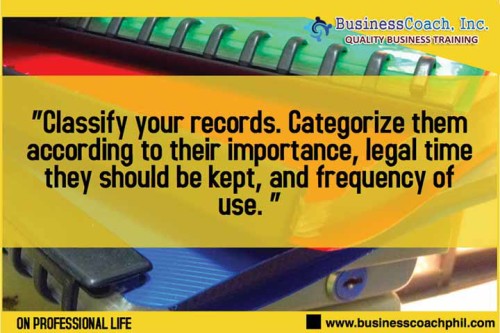Landlines: (02) 8.727.56.28 / (02) 8.569.78.84 /
(02) 8.569.46.90 / (02) 8.727.88.60
Mobile Nos: Globe: 0915.205.0133 / Smart: 0908.342.3162 / Sun: 0933.584.7266
Take Control of Your Office Records
Most managers do not rank organizing their office files highly among their priorities; it is thought to be a routine chore not to concern management. Usually this tedious task is left to the discretion of their staff. Unfortunately many of those in charge fail to do this properly for lack of proper training.
Records and filing management does not seem very important—until the time you cannot find a vital document! Then you turn your office inside out only to find out after hours or days of fruitless searching that it was lost forever, a staff has thrown it away thinking that it was no longer needed. The effect may be expenses or delays that cost a fortune.
Fortunately, the preceding scenario is not the usual case; most people do not lose documents to the trash can since we rarely dispose of an item if we think it may be needed. Instead, the opposite is the more common situation. We tend to keep items that should have been disposed of a long time ago.
With no knowledge of what and how long to keep a document, we are forced to keep tons of useless materials. The sheer volume of stored paper occupies precious office space and becomes a huge expense. Finding a needed document is like looking for a needle in a haystack. The efficiency of the entire office suffers.
Another frequent office record problem is the routing of documents. Sometimes we cannot track who has the paper we are looking for. It becomes more frustrating when you know whom you gave it to but the person denies receiving it and you have no proof to back you up.
Despite the challenges, there are many effective ways to cope with the problem of records management. To get you started, here are some tips to take control of your office records:
• Classify your records. Categorize them according to their importance, legal time they should be kept, and frequency of use.
• Digitalize your records. Find out what documents can be stored digitally. If you do not need the original or authenticated copy, it is easy to make a duplicate from a digital file.
• Minimize making copies. Unless necessary, do not make more copies than needed.
• Know when you can safely dispose of a document. Do not guess, find out the number of years you need to keep a document. Keep only what you must and throw out what is no longer needed.
• Arrange files both alphabetically and chronologically. Although, at first it is easy to locate a file using either alphabetical or chronological filing, there will come a time that it will be too large to handle easily.
• Do not leave records on the floor. Files that are in direct contact with the floor are prone to be damaged by flooding and pests like cockroaches and termites.
• Have regular pest control. Termites and other pests may irretrievably damage your files. Do not wait for that happen and do not skimp on proper pest control.
• Keep confidential papers in a secure place. Make certain that important or sensitive documents are in a locked and sturdy file.
• Invest in a fire proof vault. For critical documents that are difficult to replace like land titles and vital contracts it would be a wise investment to spend extra on a fire proof vault.
• Have a system for tracking possession of a document. Set up a procedure to document the transfer of a document. A simple acknowledgement receipt may eliminate finger pointing in case a document goes missing.
• Define the responsibility of everyone regarding record keeping and filing. Write an operating procedure that spells out in a step-by-step manner how records are to be handled. Specify such details as whether to use vertical or flat filing and the proper labelling procedures, as well as who is to do it.
Records management is no trivial task— it is important to a small company and critical to a large organization. Do not let this problem fester in your company. You may learn more by attending BusinessCoach Inc.’s seminar on “Records and Filing Management”.
Click here to view details of the training program: Records and Filing Management »
*Originally published by the Manila Bulletin. Written by Ruben Anlacan, Jr. (President, BusinessCoach, Inc.) All rights reserved. May not be reproduced or copied without express written permission of the copyright holders.



